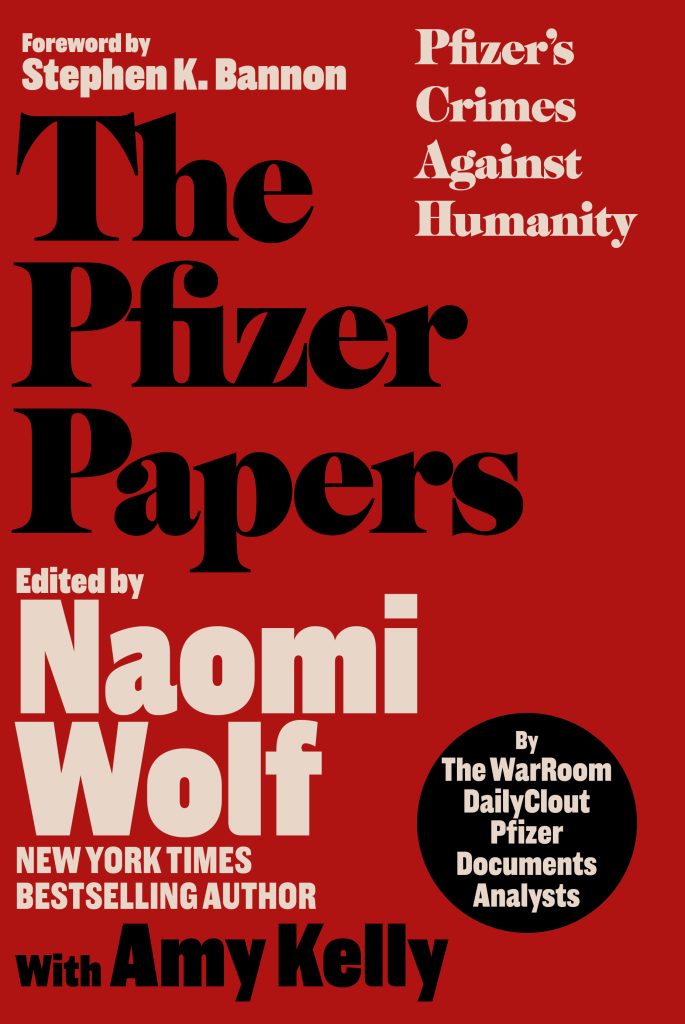“The Pfizer Papers”

Originally posted on the author’s Substack
Pfizer’s Crimes Against Humanity

When I was born, my maternal great grandmother gave me a generous gift of Pfizer stock. She had been impressed by Pfizer’s key role in discovering how to mass produce penicillin during World War II (in which her son was killed in action). Eighteen years later her gift paid for my university education. And then, in 1998, Pfizer received FDA approval to sell Viagra.
Pfizer initially developed the drug to treat high blood pressure and angina pectoris. However, as Pfizer’s researchers discovered in clinical trials, the drug was better at inducing erections than managing angina. And so, the company repurposed the drug for erectile dysfunction and launched a massive, global PR and marketing campaign—including seeking moral approval from Pope John Paul II and contracting the war hero and 1996 presidential candidate Bob Dole to be the brand’s poster gentleman—that succeeded in making Viagra a blockbuster.
So, I learned why pharmaceutical companies seek to develop blockbuster drugs with fanatical zeal. Formulating a safe and effective new medicine to address a large, unmet need is very difficult and expensive. Performing clinical trials and obtaining FDA-approval is an arduous process that normally takes several years. Thus, if an opportunity for a new blockbuster presents itself, a big drug company like Pfizer will go to extreme lengths to seize it.
Three years after the release of Viagra, I learned that Pfizer was not the respectable company my great grandmother had believed it to be. I arrived at this realization through my interest in British spy novels. In 2001 I lived in Vienna, around the corner from the Burgkino (Burg Cinema) which still played the 1949 film noir classic The Third Man on its big screen every weekend. I spent many a dreary winter Sunday afternoon watching the film. Based on the novella and screenplay by Graham Greene, The Third Man is a crime story about Harry Lime—an American running a medical charity in Vienna, who makes a killing selling penicillin on the bombed out, impoverished city’s black market. To increase his profits, he cuts the drug with other substances, thereby destroying its efficacy and causing the patients (including children) to die horribly from their infections.
In the film’s most iconic scene, the good guy (played by Joseph Cotton) meets his old friend Harry Lime (played by Orson Welles) on the Giant Ferris wheel in the Vienna Prater amusement park and tries to appeal to his conscience. At the wheel’s apex, the charismatic Harry opens the door, points down to people walking on the ground below, and says:
Look down there. Would you really feel any pity if one of those dots stopped moving forever? If I offered you twenty thousand pounds for every dot that stopped, would you really, old man, tell me to keep my money, or would you calculate how many dots you could afford to spare? Free of income tax, old man. Free of income tax. … Nobody thinks in terms of human beings. Governments don’t, why should we? They talk about the people and the proletariat; I talk about the suckers and the mugs. It’s the same thing. They have their five-year plans, and so have I.
I sensed that Graham Greene might have based the story on something he’d witnessed or heard about. Doing some research, I learned that Harry Lime was probably based on the British spy Harold “Kim” Philby, with whom Greene worked in British intelligence during World War II. Greene, it seems, discovered that Philby was a Soviet double agent long before he was exposed as such in 1963. Instead of ratting out his friend, he kept it to himself and left the intelligence service in 1944. Several pieces of evidence suggest that when he wrote The Third Man a few years later, he based it on his conflicted friendship with Philby.
John le Carré was also fascinated by Graham Greene and Kim Philby, and his thriller Tinker, Tailor, Soldier, Spy—one of my all-time favorites—was inspired by the Philby story. His novel The Constant Gardener was published in 2001, and I read it with great interest. The story wasn’t set in Cold War Europe, but in Kenya, where a British diplomat’s wife is brutally raped and murdered. Upon closer examination, the diplomat realizes that she was about to reveal a horrifying crime committed by a pharmaceutical company, which murdered her in order to prevent the exposure.
The novel’s plot was reminiscent of a controversial drug trial performed by Pfizer in Kano, Nigeria in 1996 during a meningococcal outbreak. For the trial of its new antibiotic, trovafloxacin, Pfizer gave 100 children this new drug. The control group of 100 other children received the standard anti-meningitis treatment at the time—a drug called ceftriaxone. However, for the control group, Pfizer administered a substantially lower dose of ceftriaxone than the drug’s FDA-approved standard.
When the reduced dosing in the control group was discovered, it raised the suspicion that Pfizer did this in order to skew the trial in favor of its new drug. Five of the children who received trovafloxacin died, while six who received the reduced dose of ceftriaxone died. Other children apparently suffered grave injuries from the administration of the experimental antibiotic without their informed consent. The investigation and litigation that ensued was the stuff of a thriller, involving private investigators, bribery, blackmail attempts, and disappearing records. Thirteen years later, in 2009, Pfizer settled out of court with the plaintiffs.
In his author’s note, le Carré claimed that nobody and no corporation in the novel was based on an actual person or corporation in the real world.
But I can tell you this. As my journey through the pharmaceutical jungle progressed, I came to realize that, by comparison with the reality, my story was as tame as a holiday postcard.
In 2009, the same year that Pfizer settled with the trovafloxacin plaintiffs, the New York Times reported that a U.S. federal judge assessed Pfizer with the “largest health care fraud settlement and the largest criminal fine of any kind ever” for its illegal marketing of Bextra and three other drugs. The U.S. Department of Justice was unequivocal in characterizing Pfizer’s officers as guilty of grave criminal conduct at the expense of the American public.
As I have long known all of the above, I wasn’t surprised by the gross criminal conduct revealed in The Pfizer Papers: Pfizer’s Crimes Against Humanity, edited by Naomi Wolf with Amy Kelly and a Foreword by Stephen K. Bannon. The 366-page hardcover book—beautifully published by War Room Books, an imprint of Skyhorse Publishing, is a meticulous analysis of Pfizer documents the FDA was forced to release as a result of Aaron Siri’s lawsuit.
The book strikes me as one of the most impressive works of investigative scholarship in history. As Dr. Peter McCullough described it in his Praise (printed on the book’s first page):
This is a comprehensive, organized, and compelling presentation of vaccine safety data that has accumulated after mass and indiscriminate administration of the Pfizer mRNA COVID-19 vaccines. Sadly, a large group of vaccine recipients have become injured, disabled, and many have died after the ill-advised injections. The data with histopathological evaluation at necropsy and autopsy with expert analysis is presented so you can evaluate it for yourself. Never before has there been a class of products with this wide range and extended duration of injury to the recipient.
On Saturday, November 16, I attended the official launch of this magisterial work of what I believe falls squarely within the true crime genre of literature. It was a great honor for me to attend the gathering with the book’s editors and authors. It seemed to me that I was witnessing history being made.
I strongly recommend the book to everyone in the world who is interested in truth and justice. The book should be required reading by everyone in the legislative and executive branches of the U.S. government, especially President-elect Trump’s staff.
Please purchase your copy today by clicking the link below. Producing the book was a Herculean effort. Never before have a book’s authors and publisher been so deserving of compensation for their work. I agree with Dr. Peter Breggin’s sentiment that they, as well as editor Naomi Wolf and project director Amy Kelly, “should get the Nobel Prize for medicine and the praises of a grateful humanity.”
Order “The Pfizer Papers” Today
____________
Follow DailyClout on Rumble! https://rumble.com/user/DailyClout
Please Support Our Sponsors
Birch Gold Group: “A Gold IRA from Birch Gold Group is the ultimate inflation hedge for your savings in uncertain times. Visit www.birchgold.com/dailyclout to see how to protect your IRA or 401(k).”
The Wellness Company: https://dailyclouthealth.com
Use code DAILYCLOUT for 10% off!
NativePath: Collagen supplements help you replace what you stop producing — and the studies speak for themselves. Visit https://getnativepath.com/dailyclout for a MASSIVE 45% discount plus free shipping!
Patriot Mobile: “Visit https://patriotmobile.com/dailyclout for a FREE month of service when you switch!”
Order ‘The Pfizer Papers’ and Support Our Historic Work: https://www.skyhorsepublishing.com/9781648210372/the-pfizer-papers/
Discover LegiSector! Stay up-to-date on issues you care about with LegiSector’s state-of-the-art summarizing capabilities and customizable portals. No researchers needed, no lobbyists, no spin. Legislation at your fingertips! Learn more at https://www.legisector.com
One of our country’s most important freedoms is that of free speech.
Agree with this essay? Disagree? Join the debate by writing to DailyClout HERE.




